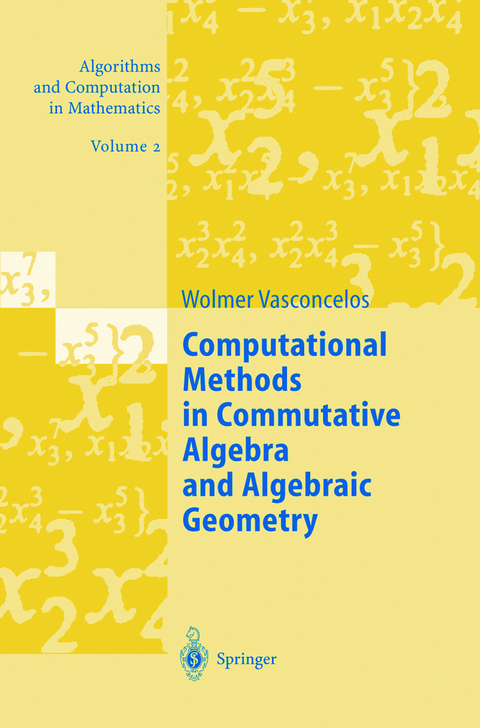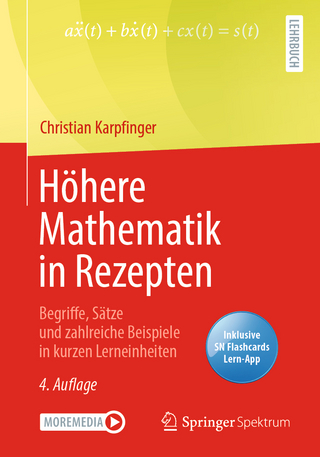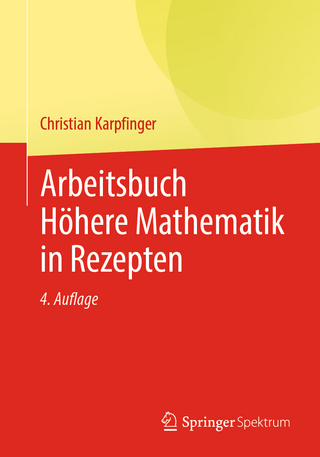
Computational Methods in Commutative Algebra and Algebraic Geometry
Springer Berlin (Verlag)
978-3-540-21311-6 (ISBN)
From the reviews:
"... Many parts of the book can be read by anyone with a basic abstract algebra course... it was one of the author's intentions to equip students who are interested in computational problems with the necessary algebraic background in pure mathematics and to encourage them to do further research in commutative algebra and algebraic geometry. But researchers will also benefit from this exposition. They will find an up-to-date description of the related research ... The reviewer recommends the book to anybody who is interested in commutative algebra and algebraic geometry and its computational aspects."
Math. Reviews 2002
"... a sophisticated notebook, with plenty of suggestions, examples and cross references ... It is a welcome new and deep exploration into commutative algebra and its relations with algebraic geometry. It is full of results, from simple tricks to more elaborate constructions, all having in common a computational and constructive nature..."
Jahresberichte der DMV 1999
1 Fundamental Algorithms.- 1.1 Gröbner Basics.- 1.2 Division Algorithms.- 1.3 Computation of Syzygies.- 1.4 Hilbert Functions.- 1.5 Computer Algebra Systems.- 2 Toolkit.- 2.1 Elimination Techniques.- 2.2 Rings of Endomorphisms.- 2.3 Noether Normalization.- 2.4 Fitting Ideals.- 2.5 Finite and Quasi-Finite Morphisms.- 2.6 Flat Morphisms.- 2.7 Cohen-Macaulay Algebras.- 3 Principles of Primary Decomposition.- 3.1 Associated Primes and Irreducible Decomposition.- 3.2 Equidimensional Decomposition of an Ideal.- 3.3 Equidimensional Decomposition Without Exts.- 3.4 Mixed Primary Decomposition.- 3.5 Elements of Factorizers.- 4 Computing in Artin Algebras.- 4.1 Structure of Artin Algebras.- 4.2 Zero-Dimensional Ideals.- 4.3 Idempotents versus Primary Decomposition.- 4.4 Decomposition via Sampling.- 4.5 Root Finders.- 5 Nullstellensätze.- 5.1 Radicals via Elimination.- 5.2 Modules of Differentials and Jacobian Ideals.- 5.3 Generic Socles.- 5.4 Explicit Nullstellensätze.- 5.5 Finding Regular Sequences.- 5.6 Top Radical and Upper Jacobians.- 6 Integral Closure.- 6.1 Integrally Closed Rings.- 6.2 Multiplication Rings.- 6.3 S2-ification of an Affine Ring.- 6.4 Desingularization in Codimension One.- 6.5 Discriminants and Multipliers.- 6.6 Integral Closure of an Ideal.- 6.7 Integral Closure of a Morphism.- 7 Ideal Transforms and Rings of Invariants.- 7.1 Divisorial Properties of Ideal Transforms.- 7.2 Equations of Blowup Algebras.- 7.3 Subrings.- 7.4 Rings of Invariants.- 8 Computation of Cohomology.- 8.1 Eyeballing.- 8.2 Local Duality.- 8.3 Approximation.- 9 Degrees of Complexity of a Graded Module.- 9.1 Degrees of Modules.- 9.2 Index of Nilpotency.- 9.3 Qualitative Aspects of Noether Normalization.- 9.4 Homological Degrees of a Module.- 9.5 Complexity Bounds in Local Rings.- AA Primer on Commutative Algebra.- A.1 Noetherian Rings.- A.2 Krull Dimension.- A.3 Graded Algebras.- A.4 Integral Extensions.- A.5 Finitely Generated Algebras over Fields.- A.6 The Method of Syzygies.- A.7 Cohen-Macaulay Rings and Modules.- A.8 Local Cohomology.- A.9 Linkage Theory.- B Hilbert Functions.- G-Graded Rings and G-Filtrations.- B.2 The Study ofRvia grF(R).- B.3 The Hilbert-Samuel Function.- B.4 Hilbert Functions, Resolutions and Local Cohomology.- B.5 Lexsegment Ideals and Macaulay Theorem.- B.6 The Theorems of Green and Gotzmann.- C Using Macaulay 2.- C.1 Elementary Uses of Macaulay 2.- C.2 Local Cohomology of Graded Modules.- C.3 Cohomology of a Coherent Sheaf.- References.
From the reviews of the hardcover edition:
"... Many parts of the book can be read by anyone with a basic abstract algebra course. It seems to the reviewer that it was one of the author's intentions to equip students who are interested in computational problems with the necessary algebraic background in pure mathematics and to encourage them to do further research in commutative algebra and algebraic geometry. But researchers will also benefit from this exposition. They will find an up-to-date description of the related research. ... The reviewer recommends the book to anybody who is interested in commutative algebra and algebraic geometry and its computational aspects." (P.Schenzel, Mathematical Reviews 2002)
"... I would describe this book as a sophisticated notebook, with plenty of suggestions, examples and cross references, reporting on the work of Vasconcelos himself and of many others. ... It is a welcome new and deep exploration into commutative algebra and its relations with algebraic geometry. It is full of results, from simple tricks to more elaborate constructions, all having in common a computational and constructive nature. It will be a gold mine especially for those commutative algebraists who share with Vasconcelos the tast for a homological point of view. ..." (E.Sernesi, Jahresberichte der DMV 1999, Vol. 101, Issue 4)
"... Das Buch ist ... kein Lehrbuch im herkömmlichen Verständnis, obwohl für Graduiertenseminare bei entsprechenden Vorkenntnissen durchaus geeignet (und vom Autor auf verschiedenen Sommerschulen auch bereits eingesetzt). Es beginnt im wesentlichen dort, wo in den oben genannten grundlegenderen Monographien insbesondere konstruktive Aspekte nicht weiter vertieft werden und ist damit ein Mosaikstein im wirklichen Sinne.
Es ist zugleich keine Monographie im herkömmlichen Verständnis, die sich an einem engen Thema erschöpfend abarbeitet, sondern mehr eine Fundgrube von Ideenund Ansätzen, in denen die verschiedensten Techniken der kommutativen Algebra bis hin zu tiefliegenden homologischen Methoden zusammenspielen. Sie sind, wie vom Autor gewohnt, oft unterschiedlich detailliert ausgearbeitet, beleuchten aber an vielen Stellen Querverbindungen, die man in dieser Konstellation in anderen Arbeiten selten findet.
Für ein detailliertes Studium insbesondere von Fragestellungen, die in den späteren Kapiteln aufgegriffen werden, wird der Leser deshalb kaum um die Konsultation der entsprechenden Zeitschriftenaufsätze herumkommen, sofern er sie nicht sowieso schon kennt. Als guter Leitfaden für ein solches Unterfangen ist das vorliegnede Buch allerdings bestens geeignet und deshalb jedem, der sich ernsthaft mit konstruktiven Methoden in der kommutativen Algebra beschäftigen möchte, zu empfehlen. ..." (H.-G. Gräbe, Computeralgebra Rundbrief GI-DMV-GAMM, Nr. 22, März 1998)
| Erscheint lt. Verlag | 18.5.2004 |
|---|---|
| Reihe/Serie | Algorithms and Computation in Mathematics |
| Co-Autor | D. Eisenbud, D.R. Grayson, J. Herzog, M. Stillman |
| Zusatzinfo | XIV, 408 p. |
| Verlagsort | Berlin |
| Sprache | englisch |
| Maße | 155 x 235 mm |
| Gewicht | 650 g |
| Themenwelt | Mathematik / Informatik ► Mathematik ► Algebra |
| Mathematik / Informatik ► Mathematik ► Geometrie / Topologie | |
| Schlagworte | Algebraische Geometrie • Commutative algebra • Computational Algebra • Computeralgebra • generators • Kommutative Algebra • Rees algebras |
| ISBN-10 | 3-540-21311-2 / 3540213112 |
| ISBN-13 | 978-3-540-21311-6 / 9783540213116 |
| Zustand | Neuware |
| Informationen gemäß Produktsicherheitsverordnung (GPSR) | |
| Haben Sie eine Frage zum Produkt? |
aus dem Bereich


